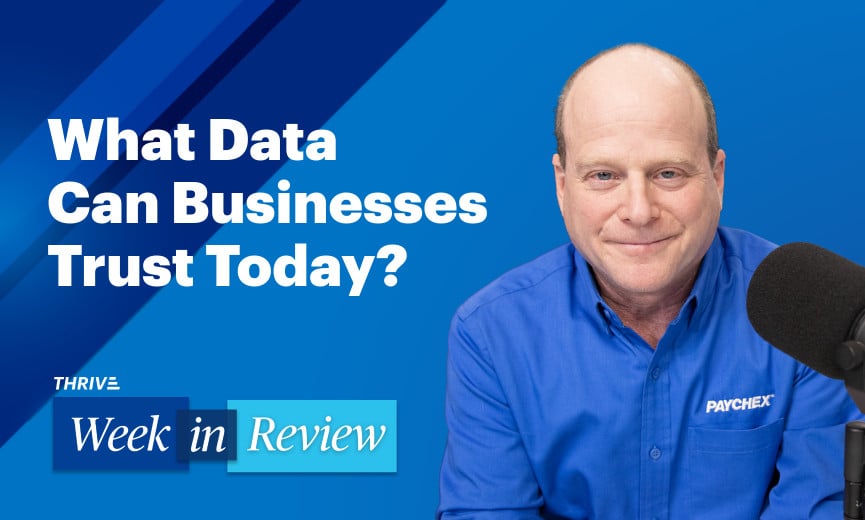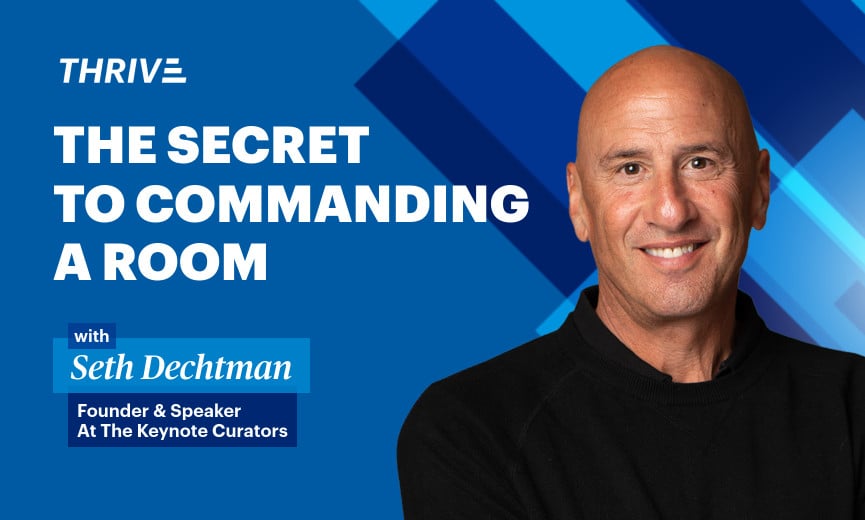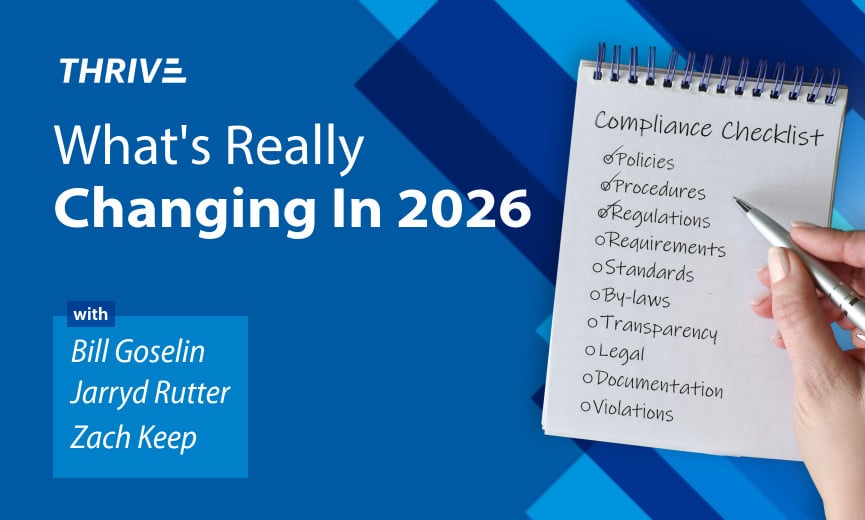- Thrive
-
Season
4Episode137
32-Hour Workweek? Small Business Government Work Declines. Insurers Collect Data.

Podcast •

Summary
U.S. Sen. Bernie Sanders introduces a bill for a 32-hour workweek and lots of perks for employees, but Gene Marks and other opponents see this as bad for small businesses. Equally bad for small businesses is the steady decline of government contract work over the past decade, but Gene offers some workarounds to boost potential. And are lower auto premiums worth the data and privacy issues that come with being tracked by insurers? Gene says it is. Listen to the podcast for more details.
View Transcript
[Gene Marks, host]
He everybody, it’s Gene Marks, and welcome to this week's episode of the Paychex Thrive podcast, “Week in Review”. Thank you so much for joining me. Hey, before we get started, just want to make sure that you're aware of our amazing newsletter where you can get advice and tips and help in running your business as well as links not only to HR Issues, but also, to our podcast too, and other content that Paychex is providing. Sign up for it at paychex.com/thrive.
Now, if you know and you listen to this podcast – this is a weekly look at the news, at least a few items of news – that impacts your small business, and some takes on them. So, let's get right to it, okay?
Item number one for news this week has to do with Sen. Bernie Sanders. This past week, he introduced a bill that would eventually move the United States to a four-day workweek without reducing pay or benefits, this is according to newser.com. The 32-hour Workweek Act would, over a period of four years, move the threshold at which overtime must be paid from 40 hours to 32 hours. For workdays longer than 8 hours, a rate of 1.5 times a worker's normal pay would be required. For workdays longer than 12 hours, that rate would go to double a worker's normal pay.
Here's what Bernie Sanders is saying. He says this is not a radical idea. “Today, American workers are over 400% more productive than they were in the 1940s, and yet millions of Americans are working longer hours for lower wages than they were decades ago. That has got to change.”
Now, of course, opponents are not really thrilled about it, saying it would impact small businesses more than larger corporations. According to one Republican senator, “If this policy is implemented, it would threaten millions of small businesses operating on a razor-thin margin because they're unable to find enough workers.”
So, a four-day workweek legislated nationally? I don't think that's going to happen any time soon, guys. But, you know, when I talk to my clients and I ask them how thrilled they would be about paying people for a 40-hour work week when they're only working 32 hours, I'm just going to say that the idea is not a super-popular one among most small businesses.
So, I realize that four-day workweeks can work in some areas, and I do realize that there are countries that are testing them out, and some companies that are testing it out, as well. Listen, if you can manage your schedules to change things into a four-day workweek, maybe 10-hour shifts for four days, that's being done a lot in different industries like health care. Hey, more power to you and go for it.
But a 32-hour workweek and getting paid for 40? I just don't think that's going to happen any time soon, but certainly it's legislation we should keep an eye on.
The next bit of news comes from the Federal News Network, which is reporting, based on a Bloomberg Government Report, that it's something about federal contracting data that's been telling, right? In the last 10 years, the number of small businesses doing business with the government has fallen – are you ready? – fallen by a third. Small companies staying in the market specialize in it.
The Federal News Network had a guest on called Larry Allen, who is a marketing consultant who was concerned about this. He says that the people that he talks to in the Department of Defense are very concerned because they've lost many small businesses and they're having particular trouble attracting new ones to the market. And he says if you listen to the Department of Defense, they're saying we need these businesses because they're the innovators, the ones that have new technologies, the ones that can help us keep our national security and, you know, technical edge, as well.
You know, the problem with small businesses, according to this consultant, is legislation and regulations. I mean, he says that like, yeah, we hear that the government wants to do more business with small businesses, but then the next thing they do is they turn around and pass bills and create more rules, and then the administrative functioning government certainly has been slacking in certain times. So, it's definitely, you know, a concern for small businesses that want to do business with the government.
So, what can be done? Well, this marketing consultant, Larry Allen, says that the biggest thing that Congress can do to attract companies to the market, is to pass appropriations bills on time. And if you're going to be – because small businesses in particular are really dependent on cash flow, they're going to be in a position where they're trying to leverage small-business technologies and innovative companies – the first thing you have to do is to provide money required to attract these small businesses.
So, pass regulations on time, provide incentives and money to small businesses to get involved, and then, of course, cut the regulations so that small businesses are finding it easier to do business with the government. I couldn't agree with him more. I think it is very, very difficult still for small businesses to get registered enough to do business with the government. There are a lot of rules and regulations to follow.
My advice, though, is that if you are looking to work with the government, go to your local Small Business Development Center – they are an arm of the Small Business Administration. Look up SBDC in your area. They usually have consultants who can provide help to get you certified as a government contractor or maybe open up some pathways for you to get some work from the government. But it definitely takes a lot of effort. It is not an easy thing, and that is why so many fewer small businesses are doing business with the government as we speak.
The final news story that I wanted to share with you comes from The New York Times last week. Are you ready? Automakers are sharing our driving behavior with insurance companies. According to The New York Times report, LexisNexis, which is a New York-based global data broker that has a Risk Solutions division, and it caters to the auto insurance industry, and it keeps tabs on car accidents and tickets. When that happens, according to one consumer who had higher insurance rates, he found out that his insurance company was aware of more than 640 of his trips, their start up and end times, the distance driven and an accounting of any speeding, hard braking or sharp accelerations.
This is all because not only is information gathered from firms like LexisNexis, but now our cars are all equipped with, you know, computers that are reporting this information back to the carmakers, who are then sharing it with the insurance companies, right.
So, also, in recent years, insurance companies have been offering incentives to people who installed dongles in your car or download smartphone apps that monitor your driving, including, you know, how you drive. But of course, a lot of drivers have been historically reluctant to this.
What do you think about this? I mean, this is not just a consumer issue, it's a business issue, as well. I mean, say you've got trucks or vehicles or cars that are owned by your business and your employees are driving them or you're driving them? That information is being reported back to your insurance company, maybe without you knowing it or maybe you did know about it, but didn't really know about it, and the insurance companies using it to come up with your premiums for the next year. What do you think about that?
It's a pretty big issue. I mean, it's definitely leveraging data. And, you know, I'm going to give you my point of view. I'm actually fine with it. Hopefully, we are driving safe and we're doing a good job. If insurance companies can find out a way to charge the more unsafe drivers or violators more premiums and keep the premiums for the rest of us lower – maybe I'm being unrealistic – but if that's what the intention of doing this, then I'm fine to share our data because I know that we would get lower premiums if that was the case.
Bottom line is, is that privacy and confidential data, I mean, it's all over the place, guys. That ship has sailed. Now it's even in our cars monitoring how we're driving so big companies can decide how much we're going to be paying for insurance.
You've been listening to Gene Marks, and this is the Paychex Thrive “Week in Review”. Again, you want some advice or tips or help in running your business, getting some links to great articles, HR issues, as well as this podcast, sign up for our newsletter; paychex.com/thrive is where you can do it.
Again, my name is Gene Marks. Look forward to talking again with you next week with some news that impacts your business. Take care.
This podcast is property of Paychex, Inc. 2024. All rights reserved.

 Apple Podcast
Apple Podcast Spotify
Spotify iHeartRadio
iHeartRadio








